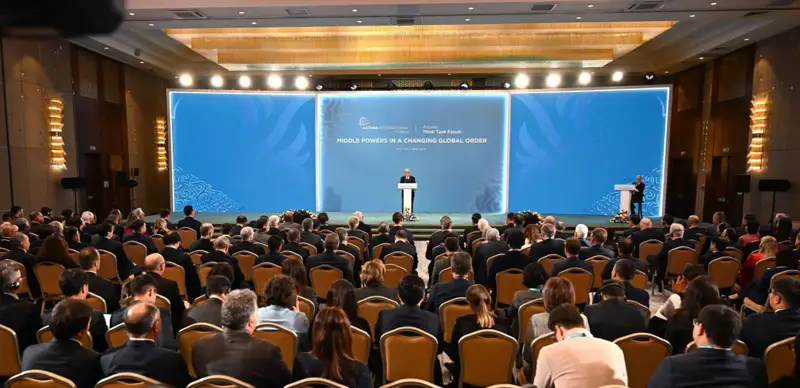Javlon Vakhabov highlights urgent need for unified strategy in Central Asia's trade and transport corridors
At the Astana Think Tank Forum, Javlon Vakhabov, Director of the International Institute for Central Asia in Uzbekistan, delivered a detailed analysis of the pressing issues surrounding trade and transport corridors in the region, Kazinform News Agency reports.

Vakhabov began by acknowledging the geopolitical limitations of Uzbekistan’s location, emphasizing the country’s ongoing efforts to overcome its status as a landlocked nation.
“Uzbekistan is moving on its own agenda to diversify transportation routes, given the fact that geography remains unchanged,” he said. “We still remain a landlocked nation, but we are determined to unlock the country and the whole region of Central Asia.”
He pointed out that while Uzbekistan’s location presents certain logistical advantages, such as being centrally positioned within Central Asia and having established transport connections by road, air, and even water with neighboring countries, the challenges far outweigh those benefits. The director also highlighted the broader regional problem of poor connectivity, calling it one of the least interconnected regions in the world.
“According to the World Bank, the region’s connectivity to the global economy averages less than 60 percent,” Vakhabov explained. He further illustrated how costly transportation affects regional trade, noting that “transportation costs for goods can account for up to 50% of the final price, which hinders trade, limits industrial cooperation, and deters foreign direct investments.”
Vakhabov also acknowledged the critical importance of infrastructure development for Uzbekistan’s vision as a key transit nation. “Since this government came to power, a great deal of work has been done to modernize transit routes, build new railways, border crossings, and logistics centers,” he remarked. He emphasized that this development was not only vital for Uzbekistan but also for the economic integration of Central Asia.
One of the most significant projects mentioned by Vakhabov was the China-Kyrgyzstan-Uzbekistan railway, which he described as a game-changer for the region. “Once this railroad project is implemented, it will significantly shorten the distance from China to Southeastern Europe by approximately 1,000 kilometers, reducing travel time by seven to eight days,” Vakhabov explained.
He further noted that even small improvements in transport times could have a major impact on regional trade, stating that “a one-day reduction in travel time along this corridor could boost trade volume between the participating countries by up to 6%.”
Another crucial initiative Vakhabov discussed was the Uzbekistan-Afghanistan-Pakistan corridor, which would provide Central Asia with direct access to South Asia’s vast markets.
“This project holds enormous potential, giving Central Asian countries access to nearly 2 billion consumers in South Asia, while South Asian nations could gain direct access to our region, home to over 80 million people,” he said.
Despite the withdrawal of international financial institutions from Afghanistan following the 2021 crisis, Vakhabov expressed optimism about the project’s future, citing strong interest from Gulf nations like Qatar and the UAE in contributing to its realization.
In conclusion, Vakhabov called for greater collaboration and strategic foresight, stating that “only through unified efforts can we achieve the regional connectivity and economic integration that is vital for Central Asia’s future.”
